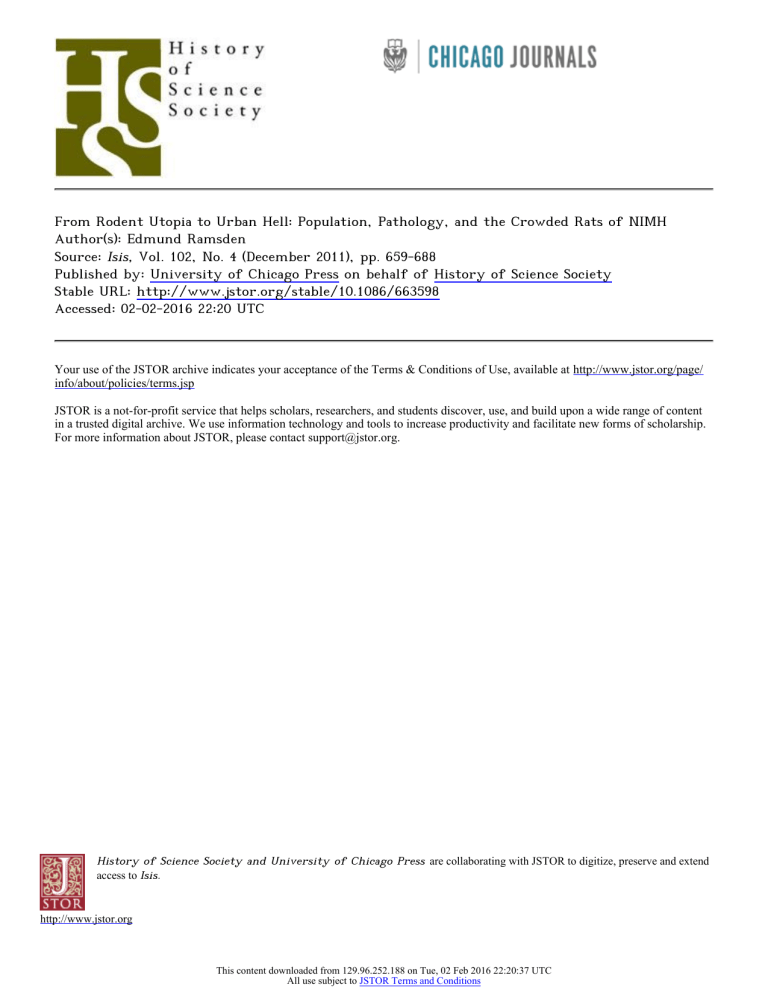
Beyond that point, any encroachment of space, or, minimal point of territorial integrity, moves the animal closer to fight distance at which point the animal decides that it cannot flee but can only fight. The reason why each of us needs more space than our physical bodies inhabit is because of something zoologists call the flight distance (The minimal distance from another animal or human at which point it decides to flee). No one needs metaphysics or density studies to figure this one out. While I have sufficient metaphysical evidence to be anthropocentric, in this case, I stand down on that stance. Human beings are in the same trapĮnough science I think? The parallels to modern human behavioural trends are quite obvious. Here is a very general summary of the various phases of his behavioural sink and it shows excesses resulting in a rat utopia lost or, in human terms, as Tennyson was wont to say, in paradise lost. As the pens heaved with animals, one of his assistants described rodent “utopia” as having become “hell” (Marsden 1972). The only restriction Calhoun imposed on his population was of space – and as the population grew, this became increasingly problematic. Calhoun described his experimental universe as “rat utopia,” or “mouse paradise.” With all their visible needs met, the animals bred rapidly. The enclosure held no predators and disease exposure was minimal. In his 1954 experiment at the Laboratory of Psychology of the National Institute of Mental Health, his rat universe was provided with as much food, bedding and shelter as the rats required. His paper became known as one of the 40 studies that changed psychology and went on to be quoted upward of a 150 times a year. He started his work in 1947 and published his findings in the Scientific American in 1962. Calhoun, the American ethologist and behavioural researcher and became famously known as the “behavioural sink”. This story (for it does read that way) was one of the most famous social experiments of all time. And, in Sri Lanka, in days when the number of humans was not that big and there was no internet for instant affirmation, my claims that rats and humans were interchangeable in the social ordering of exploding populations was deemed the stuff of a very seriously deranged imagination. I was to be left well alone, or, if touching was required, then, carefully, clad in a virus resistant coverall, with a ten foot bargepole with a condom on it. When asked where I had heard the story, I carelessly said I had read it somewhere but couldn’t remember. You see, there were no ghosts or zombies or aliens in my story and I was merely a morbid, pessimistic, storm crow. They did not remain my friends for much longer either. For me, it was the scientific bogey story to beat all bogey stories.Īlas, my friends did not seem to think so. My favourite (for a very short time) was about over-crowded rat enclosures where everything was aplenty but space at a premium. Back then, telling horror stories to each other was one of the ways of gaining acceptance among friends.

He started his work in 1947 and published his findings in the Scientific American in 1962įlashback to my early teens. If fact, those things have a tendency to infinitely compound an already impossible situation.ĭr.
#Rodent utopia free
No amount of money, power or fame can free us from this mental, physical and verbal crowdedness. Forced to absorb this, most of us are going crazy without knowing why because everyone else is also going crazy at the same time so there is no way to see it any different.

Social media-ideas sludge chocking our ability to even breath let alone think. Air, water and earth saturated with toxins. Roads snarled to a standstill by motorists. Cities overflowing with humanity and their attendant excess and waste. Drowning in a thick soup of human beings, vehicles, buildings, gadgets, ideas, thoughts, emotions – you name it, we are hammered on a daily basis by an excess of it. Even a casual glance will show us that we live overcrowded lives. So much so that we cannot now imagine a world without it. Congestion is something we take for granted these days.


 0 kommentar(er)
0 kommentar(er)
